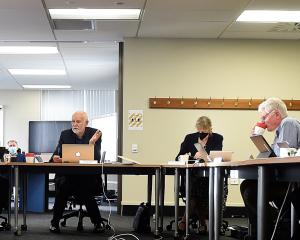The College of Midwives lodged a claim in the High Court at Wellington yesterday seeking a judicial review over a possible Bill of Rights Act breach.
The claim argues the job is underpaid because it is dominated by women. It involves about 1000 community based midwives, known as lead maternity carers (LMCs).
Community based midwives pay for expenses such as mileage, and some rural Otago midwives clock up to 45,000km a year, Ms Thomson says.
''There is no way that any other profession would do those sort of kilometres for the funding that is allocated to it.''
College of Midwives chief executive Karen Gilliland said the LMC pay problem had been ''masked'' by annual gross payments of about $100,000, which had to cover business expenses.
''If you're a rural midwife, your caseload's lower and your time commitment is massively high and so they just can't make it work,'' Ms Gilliland said.
Lead maternity carers took over work once dominated by GPs. Ms Gilliland said the once decently paid job had not kept pace because over the decades it became female dominated.
In the claim, the college's lawyer, Mai Chen, likens midwives to mechanical engineers, saying the only reason for the gap in pay between them was gender.
Ms Thomson, who is also co-chairwoman of the Otago region of the College of Midwives, said midwives were assisting more older mothers, who were more likely to have health conditions such as diabetes. She had been a midwife for almost three decades, and the job had never been so demanding.
''We are dealing with more problems than we ever used to.
''We're being asked to do more secondary services than we've ever been asked at any other time.''
Rural midwives received a small travel supplement, but it covered a fraction of the number of visits required to each mother.
''Most of the midwives I know do this job because we really enjoy it. But it takes its toll. Twenty four hours on call, seven days a week.''
Expectant mother Ella Ritchie, due to give birth next week, supports' the LMC midwives' claim. She appreciated the continuous nature of her care across her pregnancy, and the high level of responsibility it entailed.
''We are getting a good service. They are always on call - that should be recognised,'' Mrs Ritchie said.
University of Otago public law specialist Prof Andrew Geddis said the case needed to prove that the discrimination was gender based, rather than because midwives were paid from the public sector purse.
Mechanical engineers, chosen as a comparison profession, were largely based in the private sector, which could be a central factor in their more generous pay, he said.
Prof Geddis said the midwives could have taken the case to the Human Rights Commission, but that would have been time consuming.
''If you want to try to get an urgent quick answer to it, you've got to go to the High Court.''
He said the claim differed from the Kristine Bartlett caregiver case because midwives were self employed.
Claim
• Involves about 1000 lead maternity carers
• Rural Otago midwives face high mileage cost
• Case filed in High Court arguing gender discrimination
• Average pay (after expenses, before tax) $53,728
• Midwives must be available 24 hours per day or provide relief cover
• 99.9% of lead maternity carers are female
• Similar gender based argument as Kristine Bartlett caregiver case, but LMC midwives are self employed











